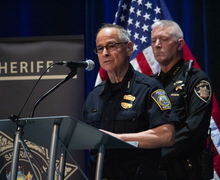Gas drilling documentary screening elicits heated opinions
Tap water is not supposed to catch on fire.
But as Josh Fox showed in his Sundance Grand Jury Prize-winning documentary ‘Gasland,’ that’s what happens when high pressure hydraulic fracturing, a controversial drilling method for extracting natural gas from shale, pollutes ground water around drinking wells.
The film screened Thursday in the Joyce Hergenhan Auditorium to more than 350 students and community members.
‘Gasland’ showed residents living near hydrofracking rigs experiencing headaches almost immediately after the wells were drilled. Animals started losing their hair and died. People experienced strange brain lesions and rare forms of cancer and died.
Fox highlighted the extreme conditions of when hydrofracking goes wrong.
Contaminated water in Colorado, toxic wells and creeks in Pennsylvania, and a recent explosion in San Bruno, Calif., have put Fox even more on the offensive.
‘We are under siege,’ Fox said. ‘A movement is building. The more people learn about it, the more people join the fight.’
Igniting a gas war
Several audience members shouted profanity at the politicians and businessmen on screen during the film.
Some audience members came with questions, some with answers. Others came with pleas for help.
‘There’s something wrong with our water,’ said Alaina Mallette, a sophomore modern foreign language and environmental policy major.
Mallette said her hometown, Watertown, N.Y., began accepting waste from a hydrofracking rig this summer.
Within days of receiving the waste, the water turned metallic-tasting, Mallette said.
After hearing about a similar case in Pittsburgh, in which the city’s main water supply was polluted by waste from a hydrofracking rig and was shut down, Mallette said she was concerned her water may have become toxic.
Mallette and her family now buy bottled water from the store. But she said she worries about the long-term effects of bathing in it, brushing her teeth with it and washing her face with it.
‘I’m not only angry about it for my own sake, but I’m infuriated with how people around the country are being silenced by these gas companies,’ she said. ‘What are we supposed to do?’
New York state has become the battleground for the future of hydrofracking, as it is the first state to take action against the industry. A moratorium passed by the New York state Senate in August banned hydrofracking in New York until May 15, 2011.
Natural gas companies like Chesapeake Energy Corp. and Halliburton Co., which use hydrofracking as their extraction method for natural gas, already have their sights set on the Marcellus Shale, a natural gas resource which runs through the eastern United States, Fox said.
More than 100 parcels of land have been leased to drilling companies that are waiting for the day when the moratorium passed against hydrofracking expires.
The film raises serious concerns about the future of New York state’s drinking water, state Sen. David Valesky said.
Syracuse’s drinking water supply comes from Skaneateles Lake, which is in the Marcellus Shale region, Valesky explained. It is unfiltered and supplies drinking water to more than 200,000 people.
‘The gas isn’t going anywhere,’ he said. ‘There’s no need to rush into the procedure. We need to make sure all safety precautions are taken and protect our public drinking water.’
Howie Hawkins wants to do more than put a hold on it. He wants to stop it altogether.
‘Regulation would just smooth the way for all these big companies to come in and drill, baby, drill,’ said Hawkins, Green Party candidate for governor of New York.
The moratorium must also pass in the state Assembly, which is set to vote on the matter following primaries next week. Then Gov. David Paterson must approve the law.
‘The Assembly needs to take action,’ said Dereth Glance, executive program director for Citizens Campaign for the Environment.
Glance said although natural gas has a reputation for being a ‘cleaner fuel,’ it is, nonetheless, still a fossil fuel, which means it is a limited resource.
Scientists quarrel
Donald Siegel, a Syracuse University professor of earth sciences, has been a longtime supporter of hydrofracking and has testified in multiple cases supporting its use.
Siegel called ‘Gasland’ a ‘piece of utter propaganda’ manufactured by environmentalists to force people to find alternative energy resources.
‘The leaders of opposition groups to hydrofracking have disseminated scientifically incorrect analogies, sometimes outright falsehoods, and exaggerations of rare accidents to generate fear of hydrofracking and the gas industry,’ Siegel said.
Siegel was employed with an oil company following graduation from college. He worked there for two years and said he has learned plenty about the oil industry.
Cornell University professor and rock fracturing specialist Tony Ingraffea disagrees.
‘Things will go wrong,’ he said, ‘and they can be serious to the environment and human health.’
The two scientists have been battling back and forth between e-mails, according to both Ingraffea and Siegel. The two were also pitted against each other in The Post-Standard.
‘He knows more about hydrology than I do,’ Ingraffea said, ‘but I know a hell of a lot more about rock fracturing than he does.’
For Ingraffea, the issue boils down to the numbers. The risk of an airplane crashing has to be one in a million for it to take flight, Ingraffea said. Same goes for an oil refinery, a bridge or any other man-made machine that poses a risk to environmental and human health.
Out of the approximately 1,500 wells built in Pennsylvania, there have been dozens of cases of water contamination and one major blowout, Ingraffea said. One in 1,500 is not good enough, he said.
But Siegel said the benefits outweigh the risks. People need oil, and natural gas burns cleaner than crude, he said. What happens to people living around hydrofracking rigs is a separate issue altogether.
‘Do we make a policy based on the rare circumstance of harm or not?’ he said. ‘I guess that’s the fundamental question.’
Published on September 12, 2010 at 12:00 pm




